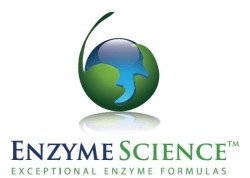Human beings naturally produce their own digestive enzymes in order to break down the foods we eat into smaller components so we can derive nutrition and energy. Additionally, some enzymes are naturally present in raw and unprocessed foods; however, today's modern diet often strips these naturally occurring enzymes from the foods we eat. When looking to use digestive enzymes as dietary supplements, it is important to note the source and potency.[1] Let's explore the benefits and science of each a bit further.

Animal-Based Enzymes
Supplemental pancreatic enzymes are the most commonly known animal-based enzymes, along with trypsin and chymotrypsin.[2] Sourcing animal-based enzymes can be challenging, given that they are typically a byproduct of the meat industry, the quality can be questionable. Animal-based enzymes are also very sensitive to low pH levels such as the stomach environment, significantly reducing their function and benefit. Comparably, animal-based enzymes are lower potency than other popular choices such as fungal-derived enzymes. Due to the fact that they are denatured in stomach acid, animal sources enzymes are not ideal for digestion. One popular approach is to enteric coat animal-based enzymes in a polymer so they can survive and pass through stomach acid. The downside is that enzyme activity in the stomach is extremely important if you are supporting digestive health. Fats and proteins are especially tough to break down, and it’s vital that this process occurs in the lower stomach. If using animal-based enzymes for systemic use, it is important to choose enteric-coated supplements so they are resistant to stomach acid and able to reach the small intestine before being dissolved and utilized.
Plant-Based Enzymes
Fresh fruits and vegetables are naturally abundant in enzymes and often thought to be the ideal source for enzymes. Protease, amylase, and lipase are three of the most common plant-based enzymes. Each of these enzymes is responsible for breaking down different macronutrients such as proteins, carbohydrates, and fats.
Contrary to animal-based enzymes, plant-based enzymes are effective within various pH levels, allowing them to work throughout the entire digestive tract and an ever-changing environment. Because of this, plant-based enzymes can begin digesting food as soon as they enter the stomach rather than waiting until they reach the small intestine. The drawback of relying on plant-based enzymes is that they are not very high potency. Two popular plant-derived enzymes used in supplements are bromelain and papain, which are extracted from pineapple and papaya.
While one may think animal-based is the preferred choice given it mimics the enzymes our body naturally produces, proper sourcing and utilization of these animal-based enzymes can be challenging.[3] Fresh fruits and vegetables are enzyme-rich and should not need to be cooked or processed if we want to derive their enzymatic properties. The closer the food is to its source, the higher the enzymatic activity is likely to be. Modern farming and food production usually get in the way of eating our food close to nature, so even plant-based enzymes may not meet the needs of those that require extra enzyme support.
Fungal Enzymes
Fungi inherently contain a wide variety of enzymes, such as proteases, amylases, lipases, cellulases. Like plant enzymes, fungal enzymes can be acid-stable and hydrolyze substrate throughout the pH of the digestive system. They are vegan so they`re suitable for vegetarians and others with specialized diets.
Fungal enzymes are commonly produced in a fermentation process using Aspergillus, which is well known in food production. For example, the majority of citric acid produced is derived from Aspergillus, and it is amongst the most prevalent and safe ingredients in prepared foods.[4]
The process by which fungal enzymes are created and purified is complex and tightly controlled. The time, temperature, pH, and ingredients of the fermentation material determine the type of enzymes that are created. A multi-step purification process then takes place which ensures that the enzyme is separated from the Aspergillus fermentation material, and then highly purified and stabilized. Enzyme manufacturers are able to derive an enormous range of types of enzymes, giving fungal sourced enzymes the position as the most broadly used enzyme source for human health.
- Roxas M. The role of enzyme supplementation in digestive disorders. Altern. Med. Rev. 2008;13(4):307–314.
- Ianiro G, Pecere S, Giorgio V, Gasbarrini A, Cammarota G. Digestive Enzyme Supplementation in Gastrointestinal Diseases. Curr Drug Metab. 2016;17(2):187-193.
- Halgreen H, Pedersen NT, Worning H. Symptomatic effect of pancreatic enzyme therapy in patients with chronic pancreatitis. Scand J Gastroenterol. 1986 Jan;21(1):104-8.
- Ramos, O. L., & Malcata, F. X. (2017). Food-Grade Enzymes. In Comprehensive Biotechnology (pp. 587–603). Elsevier. https://doi.org/10.1016/b978-0-12-809633-8.09173-1
Share:
Related Posts

Boost Your Longevity: Maintain Blood Pressure Effectively
Article written by Anita Hays, Phd, RN Senior Manager of Scientific Affairs Calroy Health Sciences Published 1 September 2024 People take supplements to improve or

How to Detox Naturally: Supporting Essential Organs Through Toxin Overload
Written by Dr Thomas Wnorowski August 02, 2024 Key Points: There are mixed thoughts on whether detox support is necessary. But it’s important to remember

6 Worst Foods for Gut Health (& What to Eat Instead)
Written by Dr Thomas Wnorowski July 05, 2024 Key Points: Unsurprisingly, the worst foods for gut health are usually the most heavily processed ones. As

How Does Sleep Help Your Immune System?
Written by Maggie Chandler May 15, 2024 In our 24/7, always-on-the-go modern world, productivity is often king, and longer workdays are treated like a

What is Aging in Place?
Written by Laura Lewis June 17, 2024 A Scientific Approach to Independence Through Nutrition and Healthy Lifestyle Independence has many meanings, and for lots of


